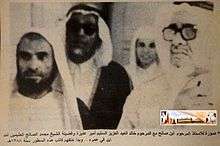Muhammad ibn al-Uthaymeen
Abu 'Abd Allah Muhammad ibn Saalih ibn Muhammad ibn Sulayman ibn Abd Al Rahman Al Uthaymeen Al Tamimi (Arabic: أبو عبد الله محمد بن صالح بن محمد بن سليمان بن عبد الرحمن العثيمين التميمي) (March 9, 1925 – January 10, 2001) was a Salafi scholar of Saudi Arabia who has been called "a giant within conservative Salafi Islam".[3]
Muhammad ibn al-Uthaymin | |
|---|---|
 From the right: Ibn Saleh with Khalid Al-Sulaim and Muhammad ibn al Uthaymeen (1968) | |
| Personal | |
| Born | March 9, 1925 |
| Died | January 10, 2001 (aged 75) Jeddah, Saudi Arabia |
| Resting place | Mecca, Saudi Arabia |
| Religion | Islam |
| Nationality | Saudi Arabian |
| Ethnicity | Arab |
| Era | 20th century |
| Region | Arabian Peninsula |
| Denomination | Sunni |
| Creed | Athari |
| Movement | Salafi |
| Muslim leader | |
Influenced
| |
| Awards | King Faisal International Prize for Service to Islam, February 8, 1994 |
| Website | http://binothaimeen.net |
Studies and Teachers
After completing his memorization of the Qur'an and foundational studies, he began his full-time religious studies under Sheikh Muhammad ibn 'Abd al-'Aziz al-Mutawwa' and Sheikh Ali al-Salihi in Unayzah. These were the two teachers that sheikh 'Abd al-Rahman al-Sa'di had appointed to instruct beginning students.[4] After one year of studying under those two teachers, al-Uthaymin began studying under sheikh 'Abd al-Rahman al-Sa'di in 1945 and continued to be his student until al-Sa'di's death in 1956. The year 1952, al-Salihi advised al-Uthaymin to enroll in the newly-opened Ma'had al-'Ilmi in Riyadh, which he did after seeking permission from al-Sa'di.[5] While there, he studied under Sheikh Muhammad al-Ameen al-Shinqiti, Sheikh 'Abd al-'Aziz bin Baz, and sheikh 'Abd al-Razzaq 'Afeefi, among others.[5] He studied there for two years before returning to Unayzah, where began teaching and continued his studies under al-Sa'di.[5]
Influence
Al-Uthaymin is still considered an influential cleric within the Salafist movement. Due to his eclectic approach of quoting from all various schools of law within Sunni Islam, readers are faced with a seemingly monolithic edifice of Islamist scholarship; while some of his views are without precedent, they are still considered definitive by many Salafists today, especially those in Egypt.[6]
Al-Uthaymin was cited by Adel Al-Kalbani and Abd al-Aziz ibn Baz against suicide bombing.[7]
Controversial fatwas
A fatwa he issued was posted on the fatwa website IslamQA.info stated that Muslim women should not use pain-relieving medication during labour and delivery as it may be a plot against Muslims "because the more births take place in this manner, the more the skin of the abdomen is weakened and pregnancy becomes more dangerous for the woman, and she becomes unable to get pregnant."[8]
Uthaymeen also controversially supported the idea that the Green Dome of Madinah should be destroyed and the graves of the Islamic Prophet Muhammad as well as his companions, Abu Bakr and Umar, should be flattened.[9][10]
In another Fatwa, Uthaymeen claimed that someone who abandons the prayer leaves Islam and that it is therefore forbidden to remain with a husband or a wife who no longer prays.[11]
According to Uthaymeen women should be banned from driving as this "would lead the free-mixing of men and women at traffic lights, petrol stations, police checkpoints as well as other car-related encounters."[12]
References
- أبو دقة, أحمد (2015-12-28). "اغتيال محمد زهران علوش... وإرباك الثورة". مجلة البيان. Archived from the original on 2017-02-02.
- أبو دقة, أحمد. "اغتيال محمد زهران علوش… وإرباك الثورة". منتدى العلماء. Archived from the original on 2017-02-02.
- Caryle Murphy (15 July 2010). "A Kingdom Divided". GlobalPost. Archived from the original on 2014-05-05. Retrieved 6 May 2014.
First, there is the void created by the 1999 death of the elder Bin Baz and that of another senior scholar, Muhammad Salih al Uthaymin, two years later. Both were regarded as giants in conservative Salafi Islam and are still revered by its adherents. Since their passing, no one "has emerged with that degree of authority in the Saudi religious establishment," said David Dean Commins, history professor at Dickinson College and author of "The Wahhabi Mission and Saudi Arabia."
- المري, عصام (دار البصيرة). الدر الثمين. الإسكندرية. pp. 25–29. Check date values in:
|year=(help) - المري, عصام. الدر الثمين. الإسكندرية: دار البصيرة. p. 86.
- Richard Gauvain, Salafi Ritual Purity: In the Presence of God, pg. 173. Part of the Islamic Studies series. London: Routledge, 2012. ISBN 9781136446931
- "Sheikh Adel Al-Kalbani, Former Imam of the Al-Haram Mosque in Mecca: Martyrdom Operations Constitute Suicide". November 18, 2011. Archived from the original on 2017-02-02.
- International Business Times: "Isis attempting to stop pregnant women having 'un-Islamic' C-section births" by Fiona Keating Archived 2015-09-23 at the Wayback Machine March 28, 2015
- Krieger, Zvika. "McMecca: The Strange Alliance of Clerics and Businessmen in Saudi Arabia". The Atlantic. Archived from the original on 2016-06-16. Retrieved 2016-06-04.
- "Medina: Saudis take a bulldozer to Islam's history". The Independent. 2012-10-26. Archived from the original on 2017-09-06. Retrieved 2016-06-04.
- "Can a Muslim say happy Christmas to his friends?". The Independent. 2009-11-26. Archived from the original on 2016-07-06. Retrieved 2016-06-13.
- Arab, The New. "Saudi religious authorities back women driving, contradicting years of strict opposition". alaraby. Archived from the original on 2017-12-12. Retrieved 2017-12-12.
| Wikimedia Commons has media related to Muhammad ibn al Uthaymeen. |
External links
- Biodata at MuslimScholars.info
- Uthaymeen's Website (Arabic language)